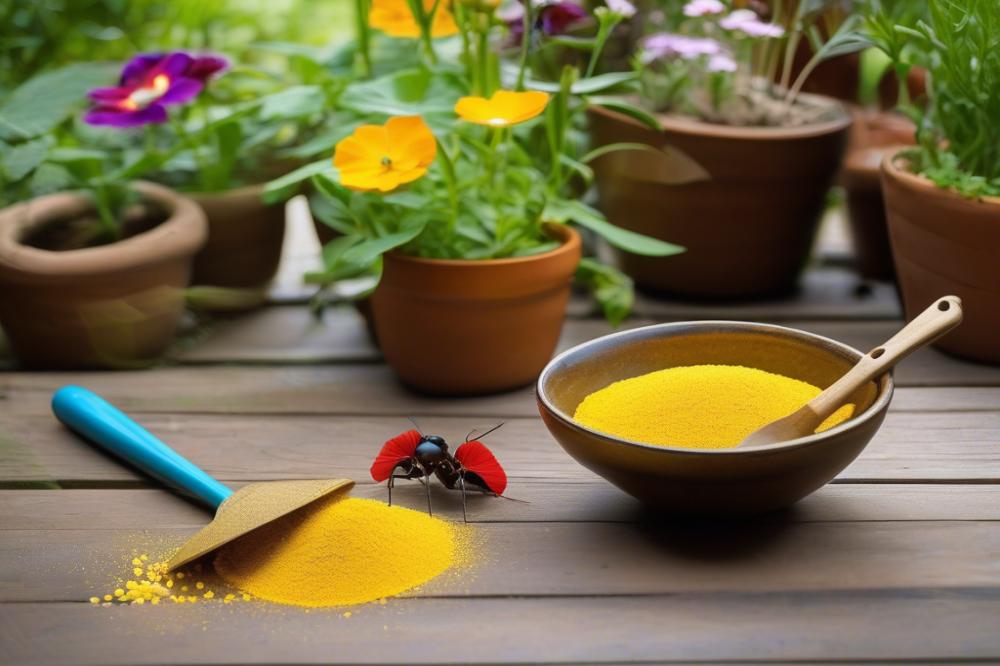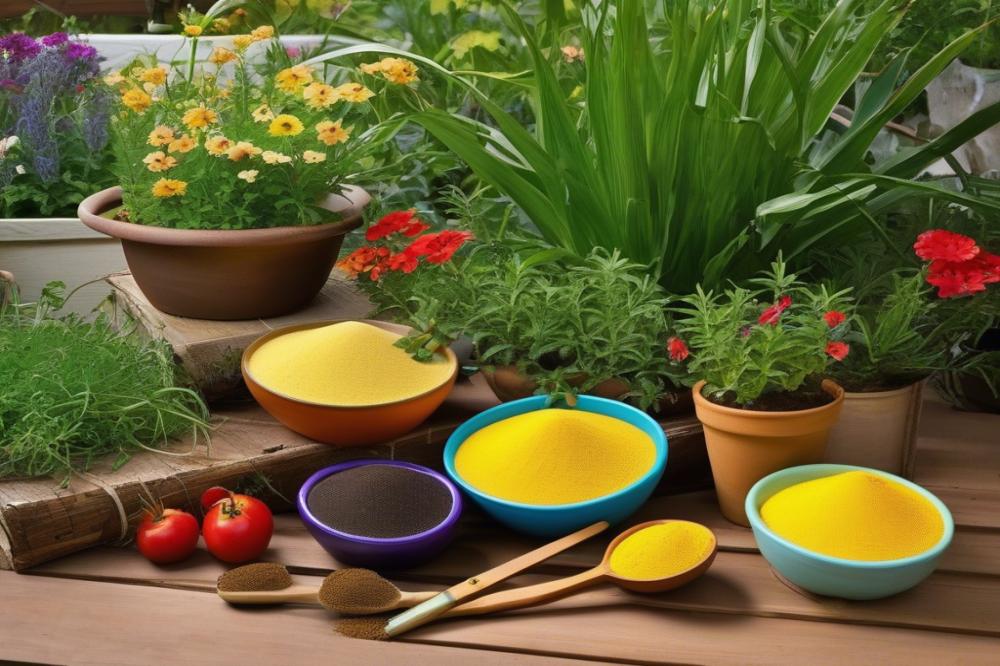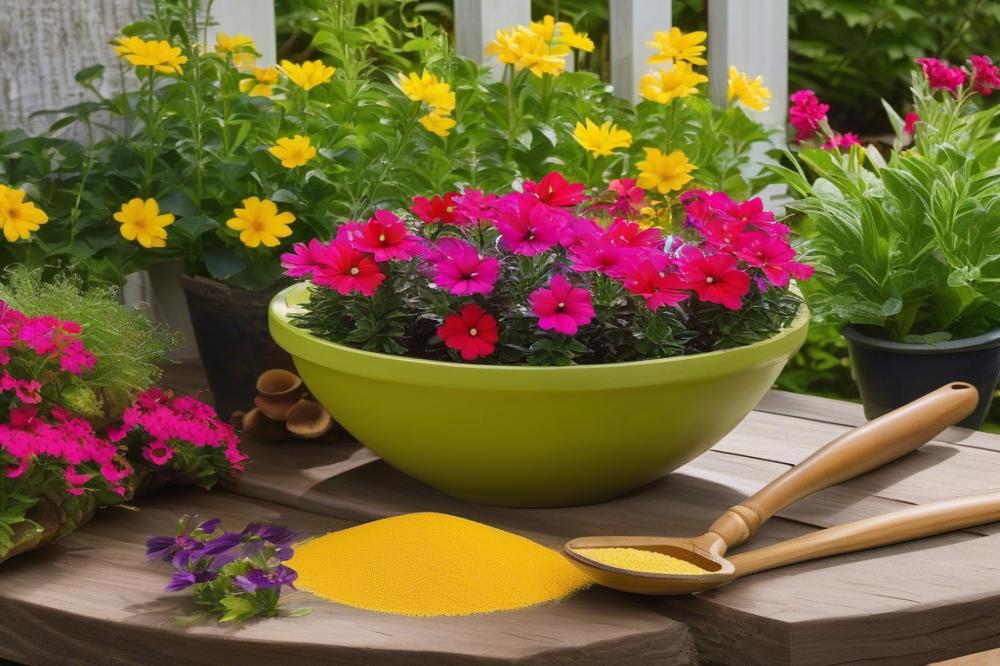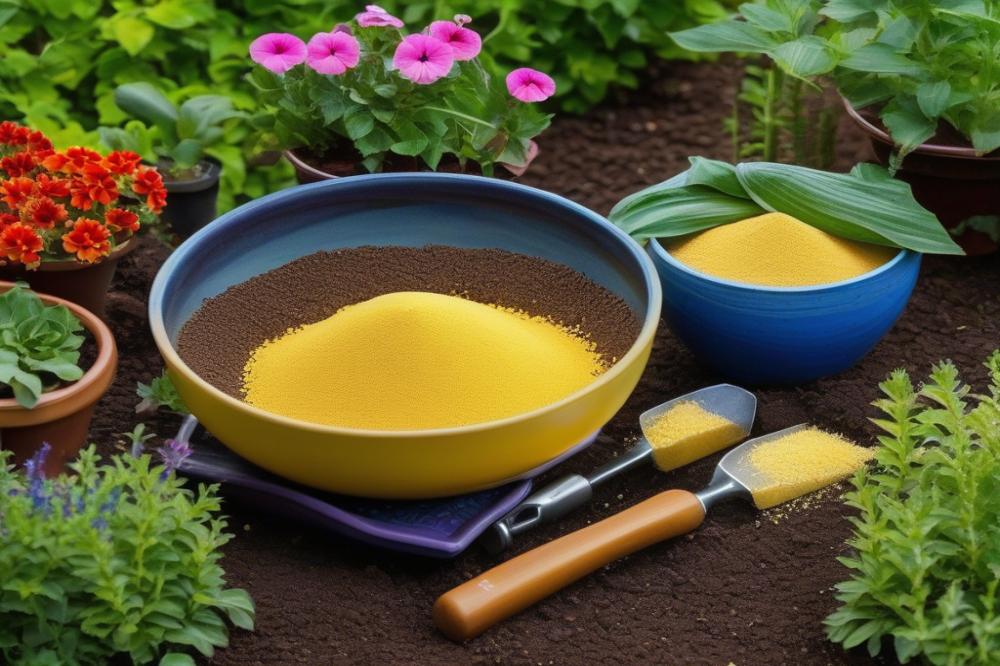Using Cornmeal to Manage Ants Organically
In the world of gardening, organic pest control is increasingly recognized as essential. Many gardeners are searching for eco-friendly solutions to deal with pests without harming the environment. Traditional chemicals can have detrimental effects on both plants and the surrounding ecosystem. Thus, a growing number of enthusiasts are turning to natural methods for pest management.
One of the common challenges in gardens is dealing with ants. These small insects can become a serious nuisance, disrupting plants and taking over your space. They may not always cause direct harm, but their presence can lead to other issues, such as attracting aphids. Understanding how to manage these pests effectively is crucial for maintaining a healthy garden.
Cornmeal has emerged as a popular choice for safe ant deterrents. This common kitchen staple can help address ant problems while supporting sustainable pest management practices. When used properly, it acts as a natural ant repellent that is both non-toxic and effective. Homemade ant traps that utilize cornmeal are easy to make and can be a great way to keep ants at bay. Gardeners looking for reliable gardening tips will find cornmeal for ants an appealing option.
Understanding Ant Behavior


Ants are common visitors in gardens across many regions. Various species can be found, each with distinct behaviors. Some of the most frequent types include the tiny black garden ant and the larger carpenter ants. While they play crucial roles in soil aeration and pest control, their presence can also lead to problems for plants. For instance, certain ants tend to farm aphids, protecting them to harvest honeydew, which can harm your flowers and vegetables.
In a healthy garden ecosystem, ants help with decomposition and seed dispersal. However, when their populations surge, they can become pests. Ants often disrupt the delicate balance needed for plant health and growth. This dual nature makes their management a critical task for gardeners. There are numerous pest control methods available, but many are not eco-friendly, raising concerns for organic gardening.
Cornmeal acts as a fascinating option for ant management. When ants consume it, they cannot digest it properly. This disruption affects their feeding and ultimately their colonies. Homemade ant traps using cornmeal can serve as safe ant deterrents without the use of harmful chemicals. One appealing aspect of this natural ant repellent is its non-toxic nature. This allows gardeners to apply this simple solution with peace of mind.
Using cornmeal is part of a broader strategy for sustainable pest management. Alongside other eco-friendly solutions, it fits well into any gardening tips aimed at repelling unwanted pests. Understanding ant behavior helps us appreciate the fine line between their beneficial and harmful actions in our gardens. By employing sound approaches, including cornmeal benefits, one can maintain a thriving garden environment.
Benefits of Cornmeal for Ant Control


Cornmeal is an intriguing option for managing ants organically. Its nutritional properties make it appealing to these pests. Ants are attracted to the carbohydrates in cornmeal, which provide them with energy. When ants consume it, they unknowingly bring it back to their colony. This can help disrupt their population.
Using cornmeal as a natural ant repellent is effective for several reasons. While it attracts them, it does not sustain them. Ants often cannot digest cornmeal properly. This leads to a decline in their numbers. Many homeowners appreciate this dual effect, where the cornmeal draws ants in while simultaneously harming them.
Comparison with Other Pest Control Methods
When we compare cornmeal benefits to traditional pest control methods, the differences are clear. Chemical pesticides may kill ants instantly, but they can harm other insects and the environment. Homemade ant traps using cornmeal provide a safer alternative. These traps are non-toxic and eliminate concerns about children or pets being harmed.
Gardening tips often suggest using cornmeal as a safe ant deterrent. Unlike many commercial products, it’s biodegradable and environmentally friendly. This makes it suitable for sustainable pest management. You can feel good about using cornmeal instead of harsh chemicals when dealing with ants.
Furthermore, cornmeal presents a unique option in organic pest control. It’s affordable and easy to find in stores. Creating a mixture for ant management is simple and effective. The thoughtful use of cornmeal aligns well with eco-friendly solutions. As more people seek natural methods, cornmeal stands out as a beneficial choice.
Preparing and Using Cornmeal in the Garden


Dealing with ants in your garden can be frustrating. Thankfully, cornmeal offers a simple solution that can help manage these pests organically. Follow this step-by-step guide to effectively use cornmeal in your ant control efforts.
Step-by-Step Guide on Using Cornmeal
Begin by locating the areas where ants are prevalent. Observe their trails and nests to gain insight into their behavior. Next, sprinkle cornmeal around these hotspots. The grains will attract ants, which consume them and take them back to their colony.
Incorporating Cornmeal into Homemade Ant Traps
Creating homemade ant traps can prove beneficial for ant management. Mix equal parts of cornmeal and sugar in a small dish. The sugar lures the ants while the cornmeal acts as a food source that disrupts their digestive system. Place these traps near ant trails for optimal results.
Safe Ant Deterrents with Cornmeal
Combining cornmeal with other natural ingredients can increase its effectiveness. Consider mixing it with baking soda. The two together create a non-toxic ant control method. Alternatively, you can blend cornmeal with peanut butter to create an enticing bait for the ants.
Timing and Application Tips for Maximum Effectiveness
Timing is key when using cornmeal for pest control methods. It’s best to apply your cornmeal solution during the early morning or late afternoon. These periods coincide with increased ant activity. Regularly monitor the traps and reapply as necessary to maintain effectiveness.
Using cornmeal for ants presents a practical and eco-friendly solution for gardening enthusiasts. By implementing these simple steps, you can enhance your pest control strategies while promoting sustainable pest management.
Combining Cornmeal with Other Natural Remedies


Using cornmeal for ants offers a solid starting point in managing these pesky insects. However, complementing this method with additional organic solutions can heighten its effectiveness. To maximize results, consider integrating other natural ant repellent options that are safe for both your home and the environment.
Exploring Complementary Organic Pest Control Methods
Among the many organic pest control methods, diatomaceous earth stands out. This fine powder can be sprinkled alongside cornmeal for enhanced results. When ants make contact with diatomaceous earth, it damages their exoskeleton, leading to dehydration. This combination offers a powerful solution without resorting to toxic chemicals.
Ideas for Combining Cornmeal with Essential Oils or Spices
Enhancing cornmeal’s effectiveness can also involve incorporating essential oils. Oils such as peppermint and tea tree carry strong scents that ants dislike. A mixture of cornmeal and a few drops of these oils could act as a potent homemade ant trap. Additionally, spices like cayenne pepper or cinnamon can be sprinkled around areas where ants are likely to enter. Not only do they deter ants, but they also add a layer of protection when used alongside cornmeal.
Utilizing Cornmeal in Holistic Gardening Practices
In the realm of gardening tips, cornmeal has a valuable role. It is not only used for ant management but can also improve soil health. Mixing cornmeal into your garden soil can foster beneficial microorganisms. This contributes to sustainable pest management by creating an ecosystem that fights off harmful pests naturally.
By mixing these eco-friendly solutions, gardeners can create a balanced approach to pest control. These methods not only target ant populations but also protect your plants. With these practical strategies, you can enjoy an organic and bountiful garden.
Gardening Tips for Preventing Ant Infestations
Creating a garden that deters ants takes thoughtful planning. Begin by regularly inspecting your garden for any signs of nesting. By identifying trouble spots early, you can take action before an infestation occurs. Strong garden boundaries can also help. A dense border of plants may discourage ants from entering your space.
Maintaining cleanliness is critical in this effort. Remove fallen leaves, decomposing fruit, and other organic matter that can attract ants. Keeping your area tidy prevents food sources that may lure these pests. Additionally, store garden tools and supplies in a neat manner. Clutter and mess can provide ants with hidden entry points into your garden.
Choosing the right plants can work in your favor. Companion planting, for example, can help deter pests with natural ant repellent properties. Certain herbs like mint and basil are known for their ability to repel insects. These plants not only support your goal of ant management but also enhance the aesthetic of your garden. They can coexist with your vegetables while helping with pest control methods.
People often overlook the power of eco-friendly solutions. Homemade ant traps made from sugar and baking soda can safely capture these nuisances without harmful chemicals. This non-toxic ant control strategy is easy to implement and effective. Moreover, using items like diatomaceous earth in your garden can further help to control pest populations. These natural alternatives align with sustainable pest management practices.
Incorporating mulch can also benefit your garden. A thick layer of organic mulch keeps the soil moist and prevents ants from easily accessing plants. Plus, organic materials break down over time, adding nutrients back into the soil. This promotes healthy plant growth, which can serve as a barrier against ant invasions.
Regularly watering plants is another essential practice. Healthy plants are less susceptible to pest problems, including ants. They thrive in a well-maintained garden, making it harder for ants to get a foothold. Ensuring your plants receive enough water supports their growth and resilience.
Finally, monitoring your garden frequently will help you catch any pest issues early. If you notice ants returning, this indicates a larger problem. You might need to adjust your strategies and consider using cornmeal benefits as part of your approach. Combining various methods creates a comprehensive plan. Remember, a proactive attitude leads to a thriving, ant-free garden.
Final Thoughts on Organic Ant Management
Using cornmeal offers several advantages for managing unwanted ants in your garden. This method aligns perfectly with the principles of organic gardening. It’s not only effective, but also prevents the use of harmful chemicals. Embracing this natural approach contributes to a healthier environment for both plants and beneficial insects.
Shifting away from toxic solutions is a choice that benefits everyone. Many gardeners are seeking alternatives that safeguard their plants while still addressing pest problems. By opting for non-toxic ant control methods, you promote sustainability in your gardening practices. Your choices can lead to a cleaner, safer ecosystem.
Why not give cornmeal a try? Consider monitoring its effects in your own garden. This simple ingredient could be your new ally against pesky ants. Your experiences may inspire others to follow suit in choosing green solutions for pest management. Share your journey with friends and fellow gardeners. Together, we can cultivate a community dedicated to organic practices.



